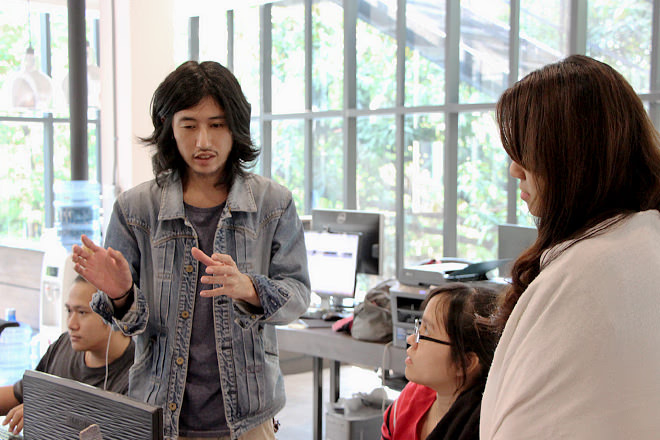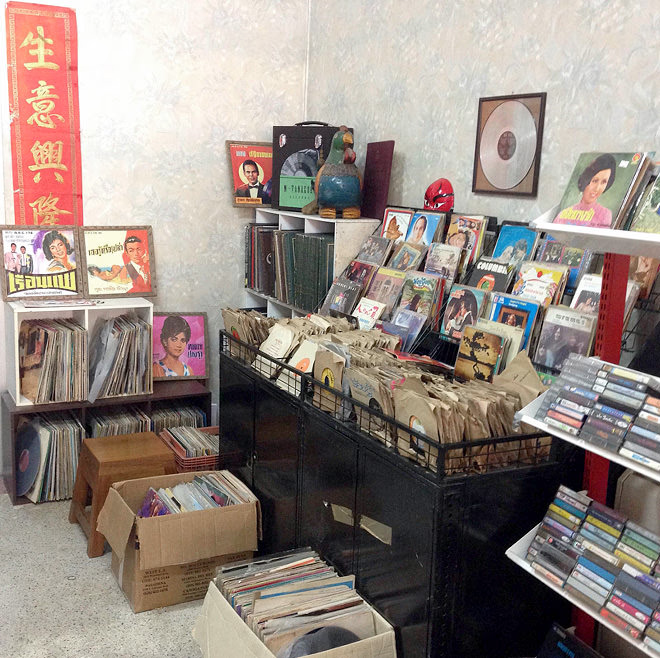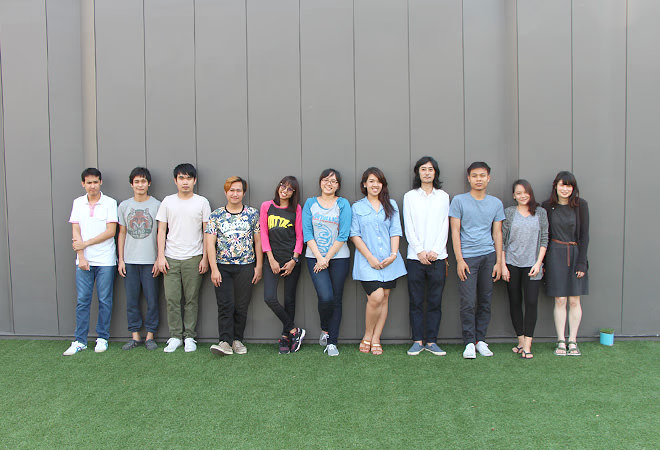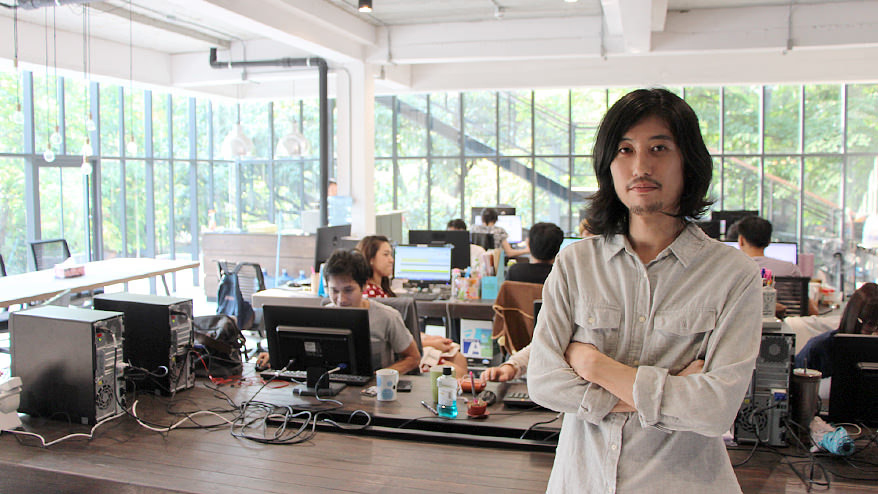計画性ゼロからのタイ移住
はじめまして。モノサスタイランドのディレクター、川村です。
今回は僕がタイで働く理由をご紹介したいと思います。
僕がタイに来たのは約4年前。
まだ震災の余韻冷めやらぬ最中。
数々の憶測、交錯する情報。
原発推進・反対、目に見えない確執。
自然と一度その状況から距離を置いてみたいと考えるようになっていました。
加えて、心の奥底でいつのまにか
見も知らぬ異国への憧れが芽生えだしていた当時。
海外で暮らすほどの知識も、語学力も、コネも無い。
ましてや仕事するなどもってのほかなのは承知の上。
それでも
「今ならまだ失敗してもやりなおせる。」
と自らに言い聞かせ、一念発起、タイへの移住を決意。
計画性の欠片も無い、移住生活がスタートしました。
タイで出会った魅惑の言葉「Web制作」
タイの生活にも慣れてきた頃、実際にタイでどんな仕事につけるのかが気になりだし、日系の人材紹介会社へ通い出します。
正直、タイ語もろくに話せない日本人が、現地採用でちゃんと職にありつけるのか不安を抱きながらも、ここタイで、ただ時間と労力を消耗するだけの仕事につくのは不本意とも思っており、時間が許す限り「新しいチャレンジができる」仕事を探すつもりではありました。
当時、僕が提示した条件は
「日本人以外と共に仕事ができること」
「何かものを作る仕事に従事したいこと」
でした。
様々な文化で育った、様々な考え方の人たちと仕事がしてみたい。
そんな漠然とした希望を出してはみたものの、やはり職種は大分限られる様子。
当時はまだ、バンコクから離れた工業地帯での管理職や営業職、事務職といった求人が大半を占めていたイメージがあります。
自分はかつて、日本にいる際にアパレルの仕事に携わっていた経緯もあり、タイのアパレル製造業などを視野にいれていましたが、ある日の面談で紹介された一件の求人。
そこに「Web制作」の文字。
正直、Web制作というものには興味を抱きつつも、敷居の高さを感じていました。
一瞬にして「Web制作」という今まで馴染みの無かったワードが頭のなかを占領してしまい、帰りに紀伊国屋でコーディングの本を買って帰ったのを覚えています。
それからはもう、他の選択肢は見えなくなっていました。
すぐさま履歴書を送り面談にこぎつけ、Web制作の世界に入っていくことに。
空想は現実へ。
タイ人と共に「ものづくり」の実感を得る。
タイで働くディレクターの主な業務内容は、案件のスケジュール管理はもちろん、お客様の要望を元に、制作に必要な情報をコーダーに漏れ無く伝達し、制作の問題点、課題点をお客様と共有し、解決に向けて舵を取っていくこと。これらは日本国内でディレクションをしていた時にも同様でしたが、大きく違うのは、やはり伝える相手が外国人とだということ。
初めは、自分の語学力やWeb制作スキルがままならない状態でのスタートというのもあり、仕様を正しく伝えることに四苦八苦しました。
言語が伝わらないという点以外にも、「何をもって正しいとするか」の日本人とタイ人での感覚の違いを目の当たりにすることになります。

タイ人スタッフへ仕様を説明する川村
まだタイで制作を初めて間もないころ、ある案件で伝え方、言い回しが悪かったせいで、指示内容がうまく伝わっておらず、制作も終盤に差し掛かった時点で、サイト全体を修正しなければならない事態が起きました。
納期を順守するため、コーダーには無理を言ってなんとか全体の修正をやってもらうことに。自分のミスで、チーム全体に負担がかかることが、何より精神的に辛い状況でした。
ただ、そんな時でも、諦めず最後までやり通してくれる仲間たち。
今思うと、Web制作を始めるまでは、これほどまで仕事での「チーム」を意識して働くことがありませんでした。
異国の地で異国の人たちと仕事をする中で、このような経験をできたことに感謝しています。
おかげさまで、現在ではタイ人とともに「ものづくり」することを実感しつつ、お仕事ができるようになりました。タイに来た当初にぼんやりと思い描いていたことが、いつのまにか、理想に近いかたちへと近づいていることに、ちょっと驚いています。
タイ音楽から生活を垣間見る。
タイの歴史と変遷。
実は僕がタイで暮らす理由は仕事以外に、もうひとつあります。
タイのイメージと言えば、元気なタイ人の笑顔と、街の喧騒との画を思い浮かべる方が多いのではないでしょうか。
一度タイに訪れた方は分かるかと思いますが、街中や市場、屋台、タクシーと、いたるところから、タイの音楽が耳に入ってきます。
言葉はなかなか聞き取れませんが、なんとも言えない独特の、俗に言う「イナタい」音楽。
タイの暑くて、活発で、混沌としている雰囲気にばっちりハマったBGMとなっている。と僕は思います。
ラジオから流れるタイの歌謡曲
そんな音楽に魅了され、巷で流れるヒットソングに飽きたらず、今ではタイの60-80年代の音楽を遡って自分なりに研究をしています。昔の音楽はCDやmp3などが少ないため、必然的にレコードやテープを売っているお店へ探しに行く必要があります。(週末の予定はこれでキマリ!)

タイの古いレコード、テープを扱うお店
タイの農村地帯に初めて電気が通ったのは80年代になってからだと、本で読んだことがあります。
60-80年代はタイにとっても激動の時代であったことは日本と同様でしょう。
田舎の貧しい生活を歌う内容が多い60年代、西洋文化、西洋音楽の多大な影響が伺える70年代の音楽から、80年代には、バンコクの若者のための都会的な音楽まで。
音楽を通してタイの歴史と変遷を垣間見るのをひとつの生きがいとして、新たな音楽との出会いを日々を楽しんでいます。
タイに根ざした新たな変化を
さて、話をもどしましょう。
モノサスタイランドは、制作部隊としては既に様々なタイプの案件に対応できるスキル、ノウハウを蓄積し、チームの規模もゆっくりとですが、順調に拡大していっています。
現在は日本国内市場のプロジェクト中心に業務を行っていますが、ゆくゆくはタイ市場、そしてより多くの国々とお仕事ができるよう、模索を続けています。
そして、日本国内外問わず、ディレクターとして、様々なお客様と共に、プロジェクトに関われるようになること、それが今の自分にとっての、ひとつの野望となっています。
スタッフ一同、これからも精進してまいります!


